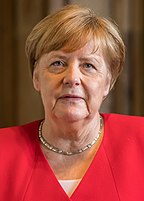- Top left: Otto von Bismarck was the first chancellor of Germany with the creation of the North German Confederation and later the German Empire.
- Top right: Konrad Adenauer was the first chancellor of the Federal Republic of Germany.
- Bottom left: Helmut Kohl was chancellor during the period of German reunification in 1990.
- Bottom right: Angela Merkel was the first female chancellor of Germany.
The chancellor of Germany[1] is the political leader of Germany and the head of the federal government. The office holder is responsible for selecting all other members of the government and chairing cabinet meetings.[2]
The office was created in the North German Confederation in 1867,[3] when Otto von Bismarck became the first chancellor. With the unification of Germany and establishment of the German Empire in 1871, the Confederation evolved into a German nation-state and its leader became known as the chancellor of Germany.[4] Originally, the chancellor was only responsible to the emperor. This changed with the constitutional reform in 1918, when the Parliament was given the right to dismiss the chancellor. Under the 1919 Weimar Constitution the chancellors were appointed by the directly elected president, but were responsible to Parliament.[5]
The constitution was set aside during the 1933–1945 Nazi regime. During the Allied occupation, no independent German government and no chancellor existed; and the office was not reconstituted in East Germany, thus the head of government of East Germany was chairman of the Council of Ministers. The 1949 Basic Law made the chancellor the most important office in West Germany, while diminishing the role of the president.[1]
- ^ a b "Neuland Grundgesetz | Abkehr von Weimarer Verfassung – Reaktion auf Nazi-Deutschland" [Virgin Soil "Basic Law" | Departure from Weimar Constitution - Reaction to Nazi Germany] (in German). Bundeszentrale für politische Bildung. 1 September 2008. Retrieved 13 March 2018.
- ^ "Tasks of the Federal Chancellor". bundeskanzlerin.de. The Press and Information Office of the Federal Government. Retrieved 13 March 2018.
- ^ Cite error: The named reference
north-german-constitutionwas invoked but never defined (see the help page). - ^ Cite error: The named reference
empire-constitutionwas invoked but never defined (see the help page). - ^ "The Seeds of Evil: The Rise of Hitler — The Constitution of the Weimar Republic". schoolshistory.org.uk. 2004. Archived from the original on 20 August 2011. Retrieved 13 March 2018.



